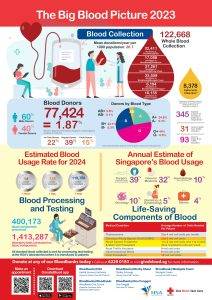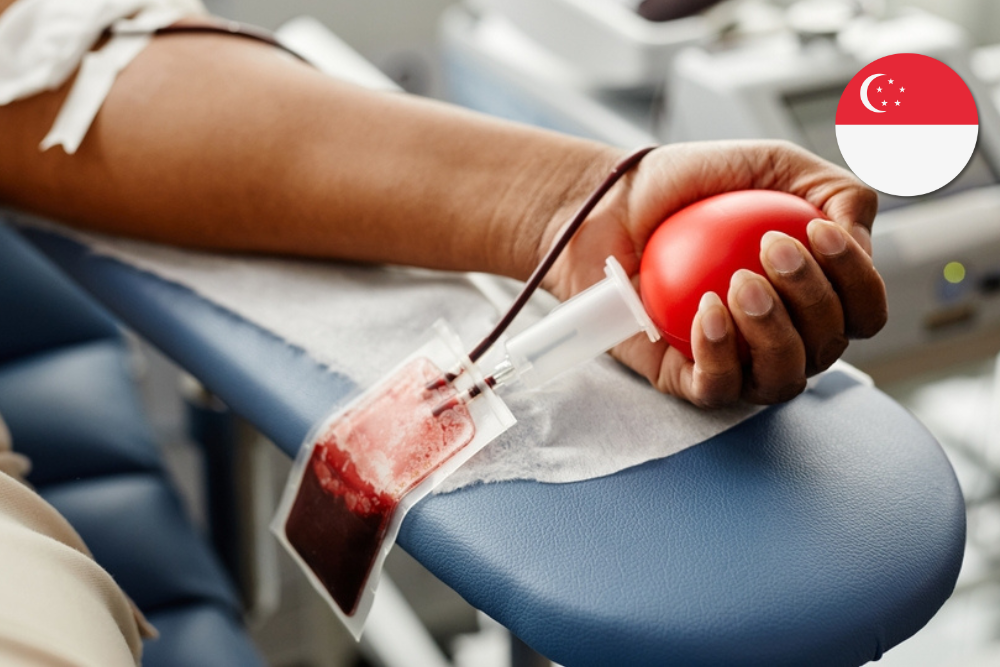Blood Supplies Running Low for Both AB- and AB+ Types in Singapore
The Singapore Red Cross (SRC) has flagged a shortage of AB- and AB+ blood supplies, urging eligible donors to come forward immediately. Both blood types are now categorised as low, with AB- previously marked as critically low.
According to SRC, these rare blood groups are vital for emergencies and treating patients with medical conditions such as leukaemia, thalassaemia, and severe bleeding disorders. Patients undergoing major surgeries also rely heavily on these blood types.

Image credit: Singapore Red Cross
Every hour, hospitals in Singapore use an average of 15 units of blood. With increasing medical needs and an ageing population, the demand for blood is expected to grow, making donations an ongoing necessity. One unit of blood can save up to three lives, underscoring the impact each donor makes.
The Singapore Red Cross encourages those eligible to donate blood this week to help replenish the dwindling stocks.
Why Should I Donate Blood?
Blood donations save lives, offering hope to patients in emergencies and those managing long-term medical conditions. Conditions such as leukaemia, thalassaemia, and severe bleeding disorders, as well as patients undergoing surgeries, depend on a steady blood supply.
Each unit of blood can save up to three lives, with hospitals in Singapore requiring an average of 15 units of blood every hour. In 2023, the nation collected 122,668 units of blood from 77,424 donors, which represents just 1.87% of the population.
Despite this, the demand for blood continues to grow, driven by new medical procedures, an ageing population, and an increasing number of hospitals.

Image credit: Singapore Red Cross
Blood is processed into red blood cells, plasma, and platelets, enabling it to meet diverse medical needs. For example, surgeries account for 39% of blood use in Singapore, followed by general medicine (32%) and haematology (10%).
If you are eligible, donating blood is a vital act that can directly save lives and ensure hospitals have sufficient supplies for emergencies and treatments.
What Happens to the Blood I Donate?
After donation, the Health Sciences Authority (HSA) ensures that all blood undergoes stringent testing for diseases and blood typing. This is to confirm its safety before it can be used for medical treatments.
Once tested, the blood is separated into three key components: red blood cells, plasma, and platelets. Each component serves a specific purpose in saving lives. For example, red blood cells are critical for surgeries, while platelets help patients with clotting disorders.
HSA shares that this meticulous process ensures every donation is optimally used, maximising its life-saving potential. These components are then delivered to hospitals, where they play a key role in emergency care and long-term treatments.
Am I Eligible to Donate Blood?
To donate blood in Singapore, you must meet specific eligibility criteria to ensure the safety of both the donor and the recipient.
- Age: You are between 16 and 60 years old.
- If you are 16 or 17, a signed parental consent form is required.
- Weight: You weigh at least 45 kg.
- Health: You are in good health with no symptoms of infection, such as a sore throat, fever, or diarrhoea, in the last week.
- Medication: You have not taken antibiotics in the last seven days.
- Haemoglobin Levels: Your haemoglobin level is at least 13.0g/dL for males and 12.5g/dL for females.
Additionally, donors are encouraged to donate blood before travelling, as visiting certain countries may temporarily affect eligibility due to infection risks.
The Blood Donation Process
Donating blood is a straightforward and safe procedure. Here’s what you can expect when you donate:
- Registration: Upon arrival at the blood donation centre, present your photo ID (NRIC, work pass, or passport). If you are 16 or 17 years old, bring a signed parental consent form.
- Health Assessment: Complete a health questionnaire to confirm your eligibility. A finger-prick test will check your haemoglobin levels to ensure it’s safe for you to donate.
- Donation: You’ll sit in a comfortable chair as the nurse prepares your arm and inserts a needle. The process takes about 10 minutes, during which around 350-450ml of blood is collected.
- Rest and Refreshments: After donating, rest for about 15 minutes and enjoy snacks and drinks provided at the centre.
On Reddit, one regular donor of over 10 years shared that the staff are always thorough with checks to ensure donors are safe to donate. Even in rare cases of feeling light-headed, they act quickly and follow up after the donation.
Comment
byu/Honest-Leopard6646 from discussion
inaskSingapore
- Post-Donation Care: You’re encouraged to hydrate and avoid strenuous activities for the rest of the day. Most donors feel fine and return to their normal routine soon after.
Another donor recalls how bringing a friend can make the first donation less daunting.
Comment
byu/Honest-Leopard6646 from discussion
inaskSingapore
For those considering blood donation, it’s important to stay hydrated and eat a light meal beforehand. Avoid heavy physical activity for the rest of the day after donating.
If you have questions about eligibility or the process, visit giveblood.sg or for more information on blood donation or to locate upcoming drives near you, visit redcross.sg/give-blood.html.

